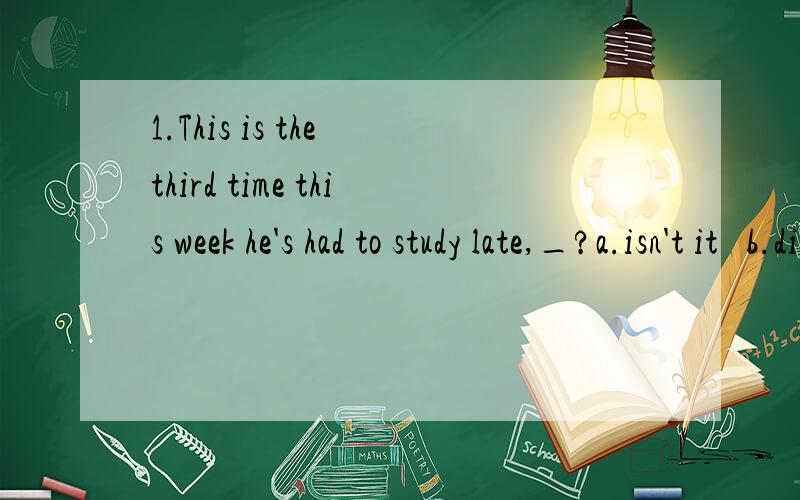1.This is the third time this week he's had to study late,_?a.isn't it b.didn't he c.isn't he d.didn't it 为何选a,为何不用didn't2._she sings.b.how beautiful d.how beautifully为何选d3.I don't think he will come,will he? He doesn't t
来源:学生作业帮助网 编辑:作业帮 时间:2024/11/20 13:28:41

1.This is the third time this week he's had to study late,_?a.isn't it b.didn't he c.isn't he d.didn't it 为何选a,为何不用didn't2._she sings.b.how beautiful d.how beautifully为何选d3.I don't think he will come,will he? He doesn't t
1.This is the third time this week he's had to study late,_?
a.isn't it b.didn't he c.isn't he d.didn't it
为何选a,为何不用didn't
2._she sings.
b.how beautiful d.how beautifully
为何选d
3.I don't think he will come,will he?
He doesn't think Mary will come,does he?
这两句话有何不同
1.This is the third time this week he's had to study late,_?a.isn't it b.didn't he c.isn't he d.didn't it 为何选a,为何不用didn't2._she sings.b.how beautiful d.how beautifully为何选d3.I don't think he will come,will he? He doesn't t
1.这个句子的主干是前半部分;即this is the third time有谓语动词is
所以反义疑问句应该用 isn't it 而不用didn't
2.这句简单啊 sings 是动词 所以修饰它应该用 副词beautifully 而不是用形容词beautiful
3.上面一句的意思是“我认为他不会来,是吗?” 针对的是“他会不会来”
下面一句的意思是“他不认为Mary会来,是吗?” 针对的是“他是不是这样认为的”
1.A isn't,因为反义问句是对主句开头的主语提问的:This is----isn't it?
2.D 只有副词beautifully才能修饰动词sing。
3.第一句中的反义提问显然是针对“他来不来”的,而不会是说话人自己;
第二句同样遵循关于1题的解释。
1.前面用的是is
2.应用副词,beautifully
3.三单
1。后面是he is 缩写成he's ,句子结构要相呼应,选isn't it
另外,is是指这一次study late,不是指以前的,所以不能用过去时态didn't,而是一般现在时isn't it
2。sing 作为动词,要用副词修饰,不能用形容词,
b正是形容词,d正是副词
3。I don't think he will come ,will he?
是...
全部展开
1。后面是he is 缩写成he's ,句子结构要相呼应,选isn't it
另外,is是指这一次study late,不是指以前的,所以不能用过去时态didn't,而是一般现在时isn't it
2。sing 作为动词,要用副词修饰,不能用形容词,
b正是形容词,d正是副词
3。I don't think he will come ,will he?
是对可能发生的事情(他会不会来)的反问。
不是对说话的人的相法的反问。
He doesn't think Mary will come,does he?
是对主语He的想法的反问。(他是不是这么想的)
不是对可能发生的事情(Mary会不会来)的反问。
收起
1. 这是这周第三次必须学得很晚,不是么?
强调的是不是第三次,因此用isn't,而不是说是不是学得很晚。
2。she sings beautifully.
形容唱歌很动听,修饰sing,用副词beautifully,而不用性容词
3。我认为他不回来,他会么?问题时他会不回来?
他认为mary不会来,是么?问题是他是不是这么认为?...
全部展开
1. 这是这周第三次必须学得很晚,不是么?
强调的是不是第三次,因此用isn't,而不是说是不是学得很晚。
2。she sings beautifully.
形容唱歌很动听,修饰sing,用副词beautifully,而不用性容词
3。我认为他不回来,他会么?问题时他会不回来?
他认为mary不会来,是么?问题是他是不是这么认为?
收起
1.'he's had to study late'是从句,所以做反义疑问句时应该将主句倒装否定。
2.'sings'是动词,应用副词修饰。
3.在叙述自己观点时反义疑问句否定从句,是主观的。
在叙述别人观点时反义疑问句否定主句,是客观的。
此类词还有:believe,suspect,supose,(be)sure,consider....
全部展开
1.'he's had to study late'是从句,所以做反义疑问句时应该将主句倒装否定。
2.'sings'是动词,应用副词修饰。
3.在叙述自己观点时反义疑问句否定从句,是主观的。
在叙述别人观点时反义疑问句否定主句,是客观的。
此类词还有:believe,suspect,supose,(be)sure,consider.
收起
safvsaf